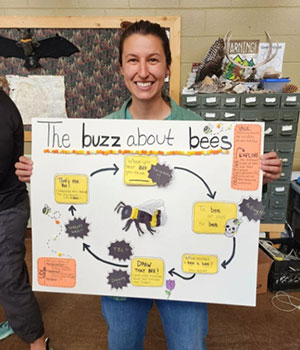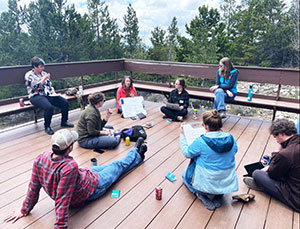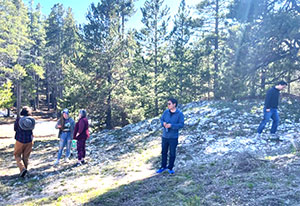Educators From UW and Five Community Colleges Participate in Science Initiative Summer Institute
Published June 16, 2023

More than 30 college educators from the University of Wyoming and five community colleges participated in the immersive LAMP (Learning Actively Mentoring Program) Science Initiative Summer Institute held at Camp Sacagawea on Casper Mountain May 16-20. The educators came together with the goal of mastering active-learning techniques with an emphasis on problem-based learning (PBL).
“Problem-based learning is a form of active learning in which students investigate authentic, messy real-world problems with the goal of proposing potential solutions,” says Rachel Watson, LAMP director. “At the summer institute, the UW and community college educators literally became students in a PBL classroom. They were introduced to the wicked problem of Owens Dry Lakebed, the desiccated lakebed formed when water was diverted from the Owens watershed by the L.A. aqueduct. The now-dry lakebed is now one of the greatest sources of airborne dust laden with toxic metals such as arsenic in North America.”
The summer institute began with educators working in expert teams to activate and contribute their specialty discipline or specific expertise to address the problem. These experts then returned to their home teams to synthesize multidisciplinary strategies to address the problem.
When educators were asked, in an anonymous poll, what it felt like to be a learner in a problem-based classroom, they often spoke about the value of learning from a diverse team of experts and shifting from initial unease to later engagement. Some of the responses include:
“It felt more engaging -- a mini-lecture describing the problem, then the ability to use past skills to address/whiteboard the problem and the work together was nice,” one educator said. “I like the sharing element where I learned how other experts would address the problem, i.e., the diversity of ideas and everyone could be involved.”
“I was cautious about sharing because I wasn’t sure of the expectations of me and my ‘expertise,’” another educator said. “However, once we got into the activities, I felt welcomed and worthwhile that my input was received well. Overall, it felt inclusive.”
“It felt like what I wished my education was like,” another educator said. “All math is problem-based, so this is a natural framework for a class.”
In both the lead-in to the problem-solving exercise and as a reflection, the ways in which PBL is an inclusive pedagogy, inviting of diverse learners, were considered.

“Opening the problem-based learning with a deep recognition of Indigenous ways of knowing -- both in our Casper-based location and in the Owens Valley -- enabled the LAMP participants to begin their teamwork with an inherently more inclusive framework,” Boggs says.
After the PBL, Zebadiah Hall, UW’s vice president for diversity, equity and inclusion, led LAMP participants in a session exemplifying the ways in which PBL is a pedagogy of inclusion. He immersed college educators in exercises that asked them to consider identity and privilege.
During the second day of the summer institute, educators continued their problem-solving by experiencing a new type of active learning called team-based learning (TBL). TBL is a more structured form of problem-based learning in which learners prepare before coming to class. Their readiness was then assessed both individually and within teams. The educators then spent the rest of the class period applying their knowledge to the problem-solving process.
“Being able to experience instruction from the student perspective provides incredible insight when considering what active-learning strategies like TBL can look like in one’s own classroom,” says Martha Inouye, a LAMP mentor and an associate research scientist with UW’s Science and Math Teaching Center. “Educators at LAMP got to experience what it feels like, what it looks like and what it sounds like to engage in collaborative learning experiences that deepen their understanding of science concepts and skills through a real-world context.”
Monia Haselhorst, a UW alumna and an associate professor of ecosystem science and stewardship at Colorado Mountain College’s Leadville campus, led the third day of learning and modified the traditional PBL and TBL approaches to integrate concept mapping.
Each day, educators were led in reflective, metacognitive sessions by Ed Nuhfer, an American Association for the Advancement of Science fellow and a tenured faculty developer from four institutions. Nuhfer has remained active in retirement as a researcher, faculty mentor and advocate for educating.
“Training develops content expertise. Becoming educated is about growing capacity as a reflective person -- developing awareness, respect and empathy for self and others while becoming a content expert,” Nuhfer says. “Training or educating? Both have their place, but metacognition enables knowing which we are doing in each moment and whether that accords with what we intended to do. LAMP is one of the few initiatives that supports faculty to gain the capacity to become educators rather than just trainers. Education is essential to address wicked problems. Mere training cannot achieve that.”
Janel Seeley, director of UW’s Ellbogen Center for Teaching and Learning, choreographed daily collaborative communication sessions. Collaborative communication is a form of reflective dialogue.

To model best practices in active learning, LAMP educators also were supported by a learning assistant. Learning assistants help instructors by facilitating team discussions; asking and answering questions; and designing active-learning strategies to support learners’ relationship-building or the instructors’ formative assessments.
“Learning assistants can be incredibly powerful in the classroom, as they help facilitate discussions and teamwork that would not be possible for just the instructor alone,” says Amy Rhoad, a UW assistant instructional professor of veterinary sciences who served as the LAMP learning assistant for the summer institute. “Learning assistants also can gain a lot from the experience as they model the idea of understanding a concept well enough that you can explain it to someone else.”
During the last two days of the summer institute, LAMP participants created and presented their own instructional strategy in which they detailed the values informing their strategy; their student learning outcomes; assessment strategies; and the active, inclusive learning pedagogies that they will implement to allow students to practice the skills that the educators aim for them to master.
Strategies ranged from the use of TBL to enable engineering students to identify, explain and solve problems related to subsurface earth stresses to the use of experiential learning to allow students to practice identifying the mathematical functions that can represent natural phenomena.
College educators who participated in the summer institute, listed by their institutions, were:
-- UW: Ahmed Abdelaty, Erin Bentley, Riley Bernard, Michelle Blakely, Kayla Burd, Kui Chen, Alathea Davies, Aysegul Demir, Briana Doering, Jay Fahlsing, Kiana Henny, Randa Jabbour, Dhawal Jain, Amy Krist, Jacob Layer, Liana Boggs Lynch, Austin Madson, Brad Orr, Amy Peterson, Ashleigh Pilkerton, Claudia Richbourg, Sheida Sheikheh, Tana Verzuh, Ryan Webb, Sabrina White, Cedar Wiseman, Ping Zhong and Zejian Zhou.
-- Central Wyoming College: Bill Finney.
-- Colorado Mountain College: Kelli McCall.
-- Eastern Wyoming College: Sherri Warren.
-- Laramie County Community College: Marie Yearling.
-- Northwest College: Dacia DeBock.

